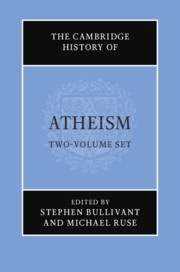Book contents
- The Cambridge History of Atheism
- The Cambridge History of Atheism
- Copyright page
- Dedication
- Contents
- Acknowledgments
- Contributors
- Introduction
- Part I Preliminaries
- 1 Linguistic History of the Terms ‘Atheism’ and ‘Atheist’
- 2 Histories of Atheism: Key Questions and Disputes
- 3 Israel and the Near East
- Part II Atheisms in History
- Part III Reformation, Renaissance, Enlightenment
- Part IV Classical Modernity: Philosophical and Scientific Currents
- Part V Classical Modernity: Social and Political Currents
- Part VI Twentieth and Twenty-First Centuries: Intellectual and Artistic Currents
- Part VII Lived Atheism in the Twentieth- and Twenty-First Centuries: Case-Studies
- Part VIII Emerging Atheisms in the Twenty-First Century
- Part IX Conclusion
- Index
1 - Linguistic History of the Terms ‘Atheism’ and ‘Atheist’
from Part I - Preliminaries
Published online by Cambridge University Press: 25 September 2021
- The Cambridge History of Atheism
- The Cambridge History of Atheism
- Copyright page
- Dedication
- Contents
- Acknowledgments
- Contributors
- Introduction
- Part I Preliminaries
- 1 Linguistic History of the Terms ‘Atheism’ and ‘Atheist’
- 2 Histories of Atheism: Key Questions and Disputes
- 3 Israel and the Near East
- Part II Atheisms in History
- Part III Reformation, Renaissance, Enlightenment
- Part IV Classical Modernity: Philosophical and Scientific Currents
- Part V Classical Modernity: Social and Political Currents
- Part VI Twentieth and Twenty-First Centuries: Intellectual and Artistic Currents
- Part VII Lived Atheism in the Twentieth- and Twenty-First Centuries: Case-Studies
- Part VIII Emerging Atheisms in the Twenty-First Century
- Part IX Conclusion
- Index
Summary
This short note will look at the history of Greek atheos and words ultimately derived from it (or in some cases modelled on it) in Greek, Latin, English, and a selection of other modern vernacular languages of western Europe. It will concentrate primarily on when each of these words first appeared in each language, with a brief consideration of its meaning. As writers far more expert on the history of atheism show in many places in this volume, investigating the history of atheistic beliefs throughout most of history is plagued by the difficulty that dire (and generally fatal) penalties could be incurred for the avowal of such beliefs. Most of the evidence for words meaning ‘atheism’, ‘atheist’, or ‘atheistic’ comes in the form of accusations levelled against individuals and/or their ideas or beliefs, and in some cases rebuttals of these, in which semantic clarity is often deliberately avoided.
- Type
- Chapter
- Information
- The Cambridge History of Atheism , pp. 11 - 13Publisher: Cambridge University PressPrint publication year: 2021



